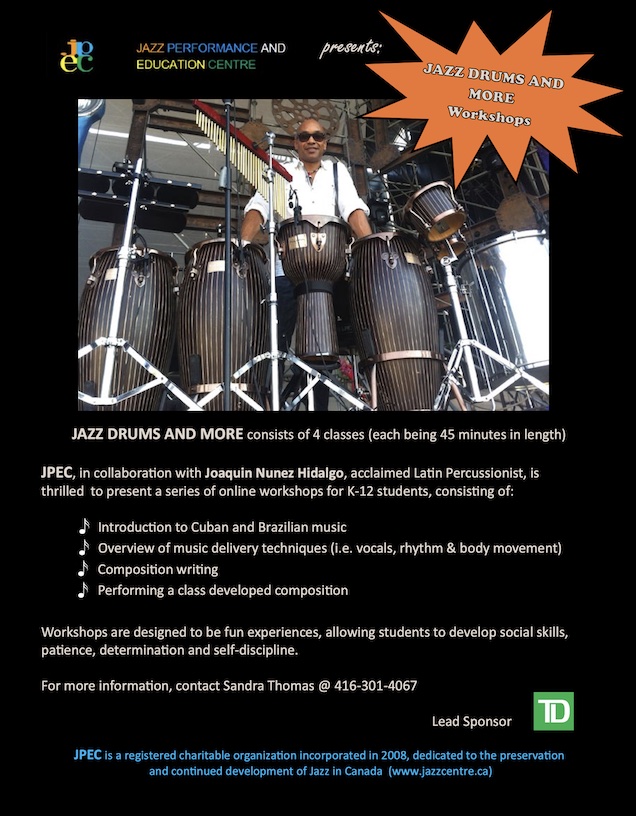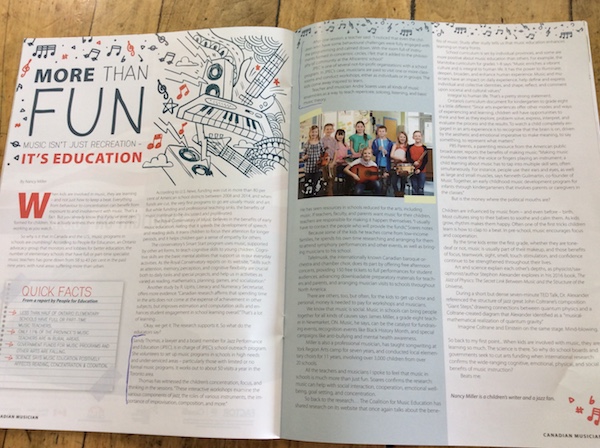Special Jazz Education
Jazz Drums and More

Jazz Education


The Media Says What JPEC Has Always Said Just in time for back to school, Canadian Musician and its sister magazine Canadian Music Trade have reminded teachers, musicians and the public of the importance of music education.
With a cover heading of "Higher Learning ? The Many Benefits of Music Education in Schools" the article in Canadian Musician says that "When kids are involved in music, they are learning ? and not just how to keep a beat. Everything from behaviour to concentration can benefit from exposure to and involvement with music."
It goes on to cite the research that supports what JPEC has always promoted with their Outreach Program. As JPEC director and head of the JPEC program, Sandy Thomas says : (JPEC's) interactive workshops examine the various components of jazz, the roles of various instruments, the importance of improvisation, composition and more.
Music as Brain Food - An Item for the School Arts Cafeteria
by Wade Potts, June, 2017 Canadian Teacher MagazineOne Toronto-based organization seeking to bridge the gap with its musical outreach program is JPEC, short for Jazz Performance and Education Centre, a not-for-profit, charitable arts organization dedicated to the preservation and continued development of jazz in Canada. JPEC's Music in the School's program is in its sixth year. Schools qualifying for the program are those in high needs or priority neighbourhoods. Costs are covered for two 45-minute interactive workshops lead by a variety of musicians. Feedback from teachers is uniformly positive. One teacher wrote: "The interactive, kinesthetic performance allowed all my students to take away information about the instruments and the culture." Another wrote: "All of the students (were) still talking and writing about the program in their respective classrooms."
A broader breakdown of JPEC's program is available at jazzcentre.ca
The current generation has seen the publication of several well received books espousing the benefits and power of music. Books like This is Your Brain on Music by Daniel Levitann and Music, Language, and the Brain by Aniruddh D. Patel offer post-doctoral science research coupled with musical knowledge and skill.
And while over two decades old, Anthony Storr's Music and the Mind continues to draw attention for its examination of music's impact on cognition.
The supposed art/science divide does not exist inside these volumes, but each field explores the other in some degree. In our current STEM (Science, Tech, Engineering, Math) academic climate, this group of authors easily finds space to insert "A" for Art, thereby upgrading curriculum to STEAM.
So why do school boards and governments seek to cut Arts in times of budgetary restraint when international research confirms the wide-ranging cognitive, emotional, physical and social benefits of music instruction?
Manitoba's Education Ministry and Ontario's Literacy and Numeracy Secretariat explain that musical activities strengthen phonological awareness, building word recognition and decoding skills. And preschool and elementary programs combining musical activities with literacy instruction find improved student scores in reading and writing tasks.
The Toronto District School Board continues to fund school music programming but even distribution of instruction is difficult in the continent's fourth largest school board. Advocacy group "People for Education" documented the erosion of school music programs in Ontario. As of 2013, one third of students did not have the opportunity to engage with an artist.
Of vital importance in access to music education are community centres and libraries for their workshop and visiting musician opportunities. Provincial and municipal arts organizations often provide support for such centres to host guest artists to lead groups in instrument making and learning songs linked to history and dates of significance.
A 2010 study prepared for the Coalition for Music Education in Canada detailed the importance of music programming in schools. Over 1000 Canadian schools took part in the study. Titled "A Delicate Balance," the 120 page document elaborated upon the challenges for a successful music program, and the benefits of having one. Opening comments underlined the importance of having a qualified teacher, a supportive administration and parent community, dedicated space for instruction, stability of staffing in coming years and, of course, a predictable budget. Removal of even one element can begin a destabilizing slide.
Other equally important programs like Health and Physical Education can come into conflict because of space and budget. Sadly, in one school, the implementation of full-time kindergarten displaced a full-time primary Orff music teacher from an instructional space.* These kinds of exchanges don't do anyone any good.
Of those primary-to-secondary schools responding to the nation-wide survey however, there was clear perception of the potential benefits of music education. With rates ranging from 60% to 75%, greater outcomes were demonstrated in the following: improved self-discipline and self-esteem among students; building community and collaboration improved the atmosphere for learning; increased achievement in other academic areas.
At the opposite end, an extreme example of the impact of budget cuts derives from New Brunswick where reductions were so severe that lack of music education caused music-focused summer camps to close. Such an event is its own negative multiplier. Not only is there diminishment of programming and its benefits within schools, but also removed are the prospects of further music education outside of school.
Art and Science explain each other's depths, as physicist/saxophonist/author Stephon Alexander explores in his 2016 book The Jazz of Physics: The Secret Link Between Music and the Structure of the Universe. During a short but dense seven minute TED Talk, Dr. Alexander referenced the structure of jazz using the great John Coltrane's composition "Giant Steps," drawing connections between quantum physics and a Coltrane-created diagram that Alexander identified as a "musical-mathematical realization of quantum gravity." Alexander discovered the diagram in a book by the late Yusef Lateef, a well-respected composer and teacher.
Alexander saw the connection to his research trying to unify quantum gravity with Einstein's Theory of Relativity. Music became the key that unlocked scientific understanding, gaining him new insight and a return to research in collaboration with colleagues. Stephon Alexander's personal journey encompassing both scientific and musical worlds is a story in itself, a lesson in how music reaches deep into our minds, preparing us for that which we have yet to discover. Or, maybe music just makes it more fun to go to school and be with others, whatever one's age, benefiting us now and in the future.
Some tips for teachers who want to support music learning:
1. Help students create instruments and then play them: e.g., drums out of plastic containers, horns out of paper towel cardboard rolls, or any toy instrument they have at home. Don't forget voices as an instrument.
2. Investigate organizations that have programs for children: everything from Tafelmusik Baroque Orchestra to the National Ballet have special programs. Some bring musicians to you at no cost to the school.
3. Check out your local community centre. Maybe together you can initiate a program for children's music.
And remember, it's not just fun. It's brain food.
* The Orff method of teaching is recognized as a method of teaching children music in a level they can understand. Founder, Carl Orff said it like this: Experience first, then intellectualize.
ABOUT THE AUTHOR
Wade Potts
Wade Potts taught for 35 years with the Toronto District School Board, and is now retired.
JPEC is highlighted in an article in Canadian Teacher Magazine saying music is brain food for kids.
JPEC's Bill McDonald has this to say about music education:
Recently, the Globe and Mail published the article, "Music Classes Taking a Beating in Ontario Schools". This was based on 2013 Annual Report published by the education advocacy group, People for Education. The full report is worth reading and is available on their website, www.peopleforeducation.ca. One particular quote from this report resonated: "When arts are treated simply as enrichment, they are particularly vulnerable to cuts in funding from the province or the school board".While this observation was made in the context of education in Ontario, it transcends provincial and national borders. We commonly hear that music programs are victims of cutbacks with the squeezing of education budgets. This is sometimes supported by the notion of implementing educational curriculum that "gets back to basics".
In reality, the value of music education goes well beyond a nice add-on to child education and development, it is just as fundamental as the time honoured "3 R's". There have been a wide range of scientific studies that speak to this. A CBC report in 2006 cited a McMaster University study on the effects of music in child learning development. Among the many positive effects, the study found particular changes in the attention systems of children who took music lessons, which affected their ability to pay attention to important things around them. "A child with a superior attention system will be able to apply that in different domains, so they'll be able to focus in on what's important in a verbal learning task, they'll be able to concentrate when figuring out a mathematical problem."
Additionally, the process of learning a musical instrument and playing with others evolves a number of skills that are fundamentally necessary not only in their remaining academic years, but their future occupations. Playing music demands dedication, discipline, and teamwork. It requires commitment to practice and rehearsing to execute a musical performance. Music also requires students to approach problem solving in creative and imaginative ways, requiring both linear and non-linear thinking. Music does not have only one right answer.
The act of analyzing music and the strategy of performance requires the same characteristics as those common to business leadership. This is brilliantly expounded in the book "Yes to the Mess: Surprising Leadership Lessons from Jazz Improvisation" by Frank J. Barrett, Professor of Management in the Graduate School of Business and Public Policy at the Naval Postgraduate School. A summary of his thesis is available on the CNN website, www.cnn.com/2013/02/21/opinion/route-to-top-jazz-business-success.
Even recognizing the importance of maintaining music programs within the education system, it is equally necessary to draw support from any number of external resources. Music specialists can augment the academic programs through their ability to delve more deeply into various musical cultures, history, and performance. In working directly with schools, JPEC sponsors musical performances and discussions using highly credentialed musicians from the local community. This is a basic tenet of JPEC.
Quite simply, better music education means better education.
Bill McDonald, JPEC Director
June 4, 2013

Charitable No. 842921298 RR0001
